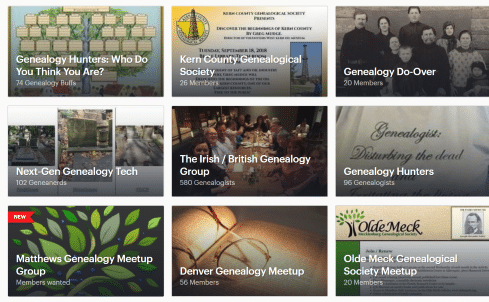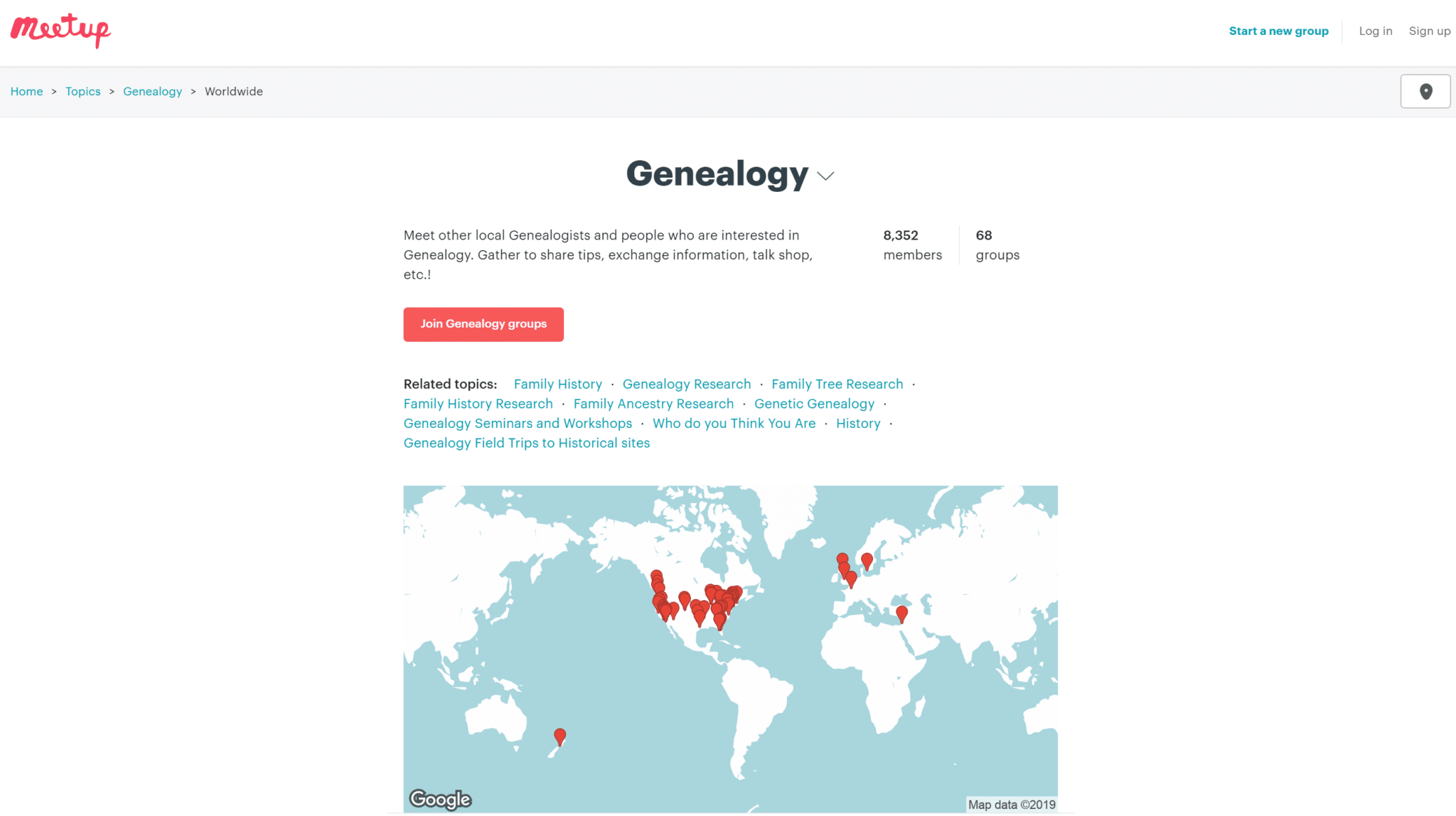By Patricia Hartley
Collaborating with others is one of the most cherished aspects of genealogy. While it’s entirely possible to make great progress conducting your family history research completely on your own, working and sharing with like-minded folks can be both helpful and a whole lot of fun.
Today there are many options for teaming up with others to talk about genealogy, compare brick walls, and share successes. Social media groups, email lists, message boards, and genealogical societies are all excellent choices. But if you’re looking for less structured, face-to-face interaction with local genealogists, you might consider joining or starting a local genealogy club.
What’s a genealogy club?
Honestly, a genealogy club can be anything you want it to be but, typically, it’s simply a group of individuals who get together in person to talk about and work on their personal genealogical research. Unlike most established genealogical and historical societies, clubs are very informal, free to join, and don’t produce publications.
Sizes of clubs vary, because most meetings are open to public to allow anyone to attend at their convenience; often registration isn’t even required. Levels of expertise also vary; beginning genealogists may attend a meeting just to learn from others how to get started, while advanced historians might benefit from bouncing ideas or theories off of an audience.
Should you start a brand new genealogy club?
Before you launch your own local genealogy club, you might want to be sure there’s not another one already in existence in your area. Of course, people may want to participate in multiple clubs, especially in larger communities or in cases where you can angle your club toward a certain sub topic, but finding an existing club to join might keep you from duplicating efforts.
To see what’s out there in your area, Google “genealogy clubs near me” or check out Cyndi’s List, where various organizations are listed alphabetically (unfortunately not geographically).
Meetup.com is a great place to find groups near your location as well. If you don’t find any groups you’d like to join, or that offer what you think your community’s genealogists need, read on to learn how to start your own!
The five W’s of getting your club off the ground
As the soon-to-be-leader of your new club, you’ll first want to establish your club’s five W’s — who, what, when, where, and why — before you start advertising and recruiting.
- WHO will you invite into your genealogy club? Most groups are open to anyone and everyone, but you may have particular goals in mind, like starting a club for kids and teens, or perhaps for seniors, or maybe you want to focus on a particular topic, like African-American research. Narrowing down your club’s main area of interest will also narrow your potential pool of participants. This could be helpful in larger metropolitan areas, but could be a detriment in smaller communities.
- WHAT do you want to your club to be? A relatively static group that meets weekly with a formal agenda and refreshments, or a monthly opportunity for a free-flowing, open-attendance workshop? You may have a vague idea of what you’d most enjoy or what you think would appeal to folks in your area. Just remember that it’s a club, not a chartered organization, so you can change things up if and when you’d like.
- WHEN do you want to meet, and for how long? This will depend largely on your availability as well as the other W’s (where you’re meeting, what you’re doing, who’s invited), but monthly is usually a good frequency to begin with.
- WHERE will you get together? The majority of genealogy clubs seem to be sponsored by libraries, and thus hold meetings in a library’s community room or local history section. There are definitely benefits to being just arm’s-length away from your library’s resources like books, microfilm, and access to online genealogical subscriptions. However, coffee shops, churches, community centers, archives, and restaurants are also great options.
- HOW will your club function, and what do you want your role to be? Most meetings, even informal ones, need a leader, or at least someone to kick off the discussion or work session. If the club is your idea, this will have to be you at first, but eventually duties could rotate. Also consider if you’d want to invite a speaker to your meetings, or let the members fill the time. Advertising a speaker could help to drum up interest in your group, but allows your club members less time to work on other projects or speak among themselves.
- You will also want to consider whether or not you want to provide some educational materials for your club – such as a beginner genealogy how-to guide, a list of well-known online resources or step-by-step materials on various topics. Family History Daily offers many of these resources on our website and you can always email the editor to request to use them in your club for free. You might also consider purchasing an online genealogy course to educate yourself on various topics and have something to reference when a question comes up.
Time to advertise!
Now that you have at least a tentative plan for your genealogy club, it’s time to get the word out. Your club will need a name, but it can be as simple as “Smith County Genealogy Club” or “Jonesville Library Genealogy Club.” Once you’ve settled on an appropriate moniker, try one or all of these options to gauge interest and/or advertise your inaugural meeting:
- Facebook: Chances are you’re already participating in Facebook groups or following pages that focus on genealogy or local history. Create and share a post or an event about your group in both your personal page as well as within appropriate groups and pages. You may also want to start a group on Facebook for your club to help people find you and connect in-between meetings.
- Twitter and Instagram: Never underestimate the power of a hashtag! Adding hashtags like #genealogy, #familyhistory, or #genealogyclub will help people who are interested in these topics find your posts.
- Print: An old-fashioned flyer pinned to a community center or library bulletin board is a tried-and-true way to catch the attention of particular audiences, as is a free community event announcement in your local newspaper.
- Meetup: This online service is “used to organize online groups that host in-person events for people with similar interests,” including genealogy clubs. Meetups are sorted by interest and geography, and setting up a meetup is simple and free. Just visit their site to get started.
- Word-of-mouth: Another oldie-but-goodie! Share your new club with your friends, family, neighbors, and key people within your community like your local history librarian, archive staff, and members of the genealogical societies. Ask them to spread the word for you.
Your announcement should share your five W’s as well as anything your potential participants will need to bring with them, like laptops, family charts, old photos, or other documents. Let them know if food will be served, if wifi is available, and any other details you’d like to know if you were reading your notice.
Your first meeting
Depending on your group’s goals and where you meet, you may some prep work to complete prior to your first meeting. Do you need handouts, such as those mentioned above? If you have a speaker, will they need wifi or a screen for a presentation? Are you going to serve cookies and punch?
Greet your guests, reiterate your goals and how the meetings will work, and get started! Remember to close your meeting by reminding everyone about your next meeting time. Your club may very well evolve as you continue to meet and grow, but at first you’ll need to set the stage and create a repeatable structure.
Remember, your genealogy club doesn’t have to be formal or fancy. The biggest benefit is meeting with other family historians and having a forum for questions and discussion (as well as some fun!)
For nearly 30 years Patricia Hartley has researched and written about the ancestry and/or descendancy of her personal family lines, those of her extended family and friends, and of historical figures in her community. After earning a B.S. in Professional Writing and English and an M.A. in English from the University of North Alabama in Florence, Alabama, she completed an M.A. in Public Relations/Mass Communications from Kent State University.




Trying to get started. I have looked at some census files, but the handwriting is difficult to read on a few of them and the information isn’t matching from census to next census. How do you know what is accurate? What other resources can I use than the census? Want to do my dad’s side and my mother’s side, but working on my mother’s side only at the time.
Very helpful. Do you have a sample survey of participants’ knowledge level and personal motivation for doing genealogy? I’ve started making notes, but would love to see what others have done. Thank you.